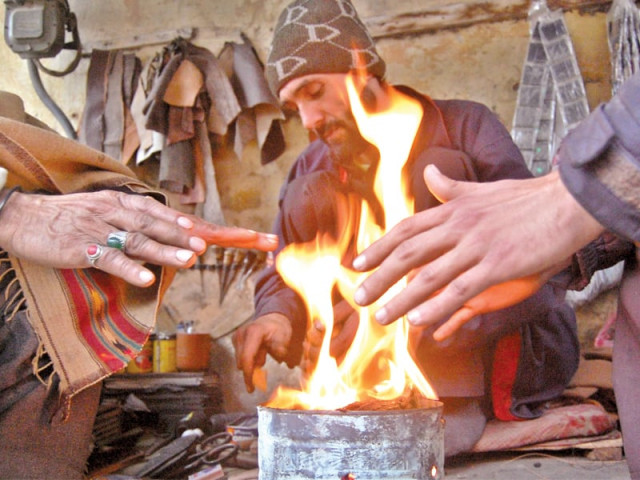In twin cities: Rain aggrevates people’s loadshedding woes
Rawalpindi streets flooded; gas, electricity become a rarity.

Residents of the twin cities were forced to use firewood to keep warm (top), while children were drenched in rainwater on the way home (right). Slippery roads also saw multiple accidents due to reckless driving. PHOTOS: INP, MUHAMMAD JAVED
The first rain of the New Year brought relief to some residents of Islamabad and Rawalpindi who were suffering from ailments due to the dry spell, but added to the miseries of many others by causing power and gas loadshedding.
Gas and power outages
With the drop in temperature, the sufferings of the residents of sectors G-6, G-7 and other areas of Islamabad and Rawalpindi continued due to the persistent gas and power outages.
“The little happiness that the rain had brought was taken away by the fact that it soaked our stock of firewood — which is the only way we can cook and keep the house warm these days,” said Rukhsana Bibi, a resident of G-7/3.

The concerns of Shazia Begum, a resident of Pirwadhai also resonated with those of Bibi, as her household had run short of hot water in absence of both gas and electricity. Her son, completely drenched in rainwater on his way home from school, was shivering in the cold.
After the rain, fish and dry fruit vendors saw a throng of customers, but local fast food retailers and stall owners, who otherwise look forward to such weather, were disgruntled.
“The rain has brought increased demand for samosas and pakoras, but we cannot meet the demand due to the low gas pressure,” complained Shahid Hussain, a samosa vendor in Aabpara Market.
Meanwhile, in Rawalpindi, families are using Liquefied Petroleum Gas and coal, while a majority of naanbais are using firewood to fuel their ovens. The rain also exposed the city government’s performance, as most streets and roads remained inundated with rainwater due to the poor drainage system.
Health perspective
Compared to 2012, the last month of 2013 saw a 20 per cent increase in the number of patients suffering from seasonal flu, allergies and eye infections, according to Dr Asadullah Nemati, a senior chest Physician at Pakistan Institute of Medical Sciences (Pims). He blamed the dry spell coupled with gas loadshedding for the sharp rise.

“One question we are bombarded with, and to which we have no answer, is how the sick can keep their homes warm in the absence of gas and electricity,” the doctor added. “Patients complain they don’t even have hot water at home to prepare soup or a cup of tea.”
Though hopeful that the rain will help bring the number of patients down, Nemati also cautioned that people should take every possible measure to keep warm and to avoid exposure to the cold, as they will be greater risk of catching pneumonia. Asthma patients and infants should especially avoid exposure, he added.
Forecast
Chief Meteorologist Dr Ghulam Rasul told The Express Tribune that light to moderate rain will continue till Thursday and that it will likely bring good news for farmers as it would benefit wheat, barley, gram, mustard, peas and lentil crops.

The bad news, he informed, is that there is no chance of heavier rainfall this winter, but the snowfall in the mountainous areas of the country would help fill the dams ahead of next summer.
Published in The Express Tribune, January 9th, 2014.



















COMMENTS
Comments are moderated and generally will be posted if they are on-topic and not abusive.
For more information, please see our Comments FAQ